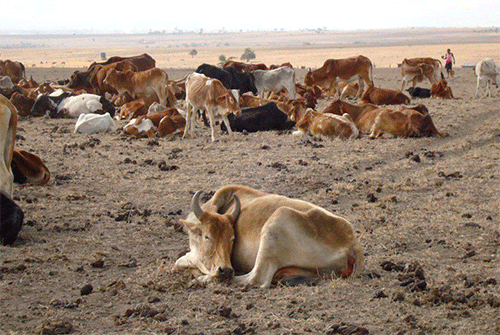Livestock worth over N$6 million were stolen from farms and villages across the Omaheke region during the last financial year, regional governor Pijoo Nganate revealed last week.
Nganate said the region reported 321 stock theft cases, of which 520 were for large and 796 small stock, with a total value of N$6.1 million.
Fortunately, Nganate said, a total of 215 large livestock and 247 small livestock to the value of N$2.1 million were recovered.
According to Nganate, livestock theft is a problem in the Witvlei, Summertown, Omitara, and Steinhaussen, as well as in communal areas, particularly in Eiseb and Tallismanus.
“We plead with all peace-loving residents to cooperate with the directorate of veterinary service officials and the Namibian police so that the culprits can be brought to justice,” Nganate told region inhabitants while delivering the state of the region address.
He said other crimes faced by the region include assault with the intent to do grievous bodily harm, housebreaking with the intent to steal and assault in general.
Nganate also stated that gender-based violence (GBV) is still common in the region, blaming it on drug and alcohol usage.
Meanwhile, to address food security at household level in the region, Nganate said the Directorate of Agricultural Production Extensions and Engineering Services (DAPEES) provided ploughing service to 474 farmers in the region, of which 294 were male and 180 were female-headed households.
He said the directorate also distributed subsidies of 6512 kg of maize seed and 3643 kg of cowpea seed under the Dryland Crop Production Programme (DCPP).
In addition, Nganate said the National Horticulture Support Programme is being implemented to diversify the household food bank and introduce local food products into the Namibian market.
This project, he said, constituted a government subsidy for seed, fertiliser, pesticides and materials for vegetable production at farmers’ fields, where the government carries approximately 60% of the costs, and the farmer contributes 40% of the total costs of input.
He said a total of 32 farmers (on a competitive basis) were assisted from the N$700 000 appropriated for the project and facilitated through the Omaheke Regional Council.
“This project is rolled out through a public-private partnership, where suppliers, such as Kaap Agri, make available their stock for purchase during the year in review,” he said.
Similarly, Nganate said 37 households started with chicken production, where the government subsidy is 60% of the cost in the form of stock of chickens, feed, vaccines as well as building and feeding materials under the Poultry Value Chain project.
“Approximately N$300 000 was utilised for this project during the year in review,” Nganate said, adding that although these efforts are highly commendable, the issue of malnutrition seems to be creeping up in the region.
“We need a concerted approach that would arrest the situation immediately,” he added.
He said the agricultural ministry, through the Small Stock Development and Distribution in Communal Areas (SSDDCA), rolled out a project, whereby 20 households received goats.
He said these goats are to be multiplied and their offspring revolved to other farmers in the region for years to come.
According to him, the initial stock was distributed in Otjombinde, Epukiro, Otjinene and Aminius constituencies.


